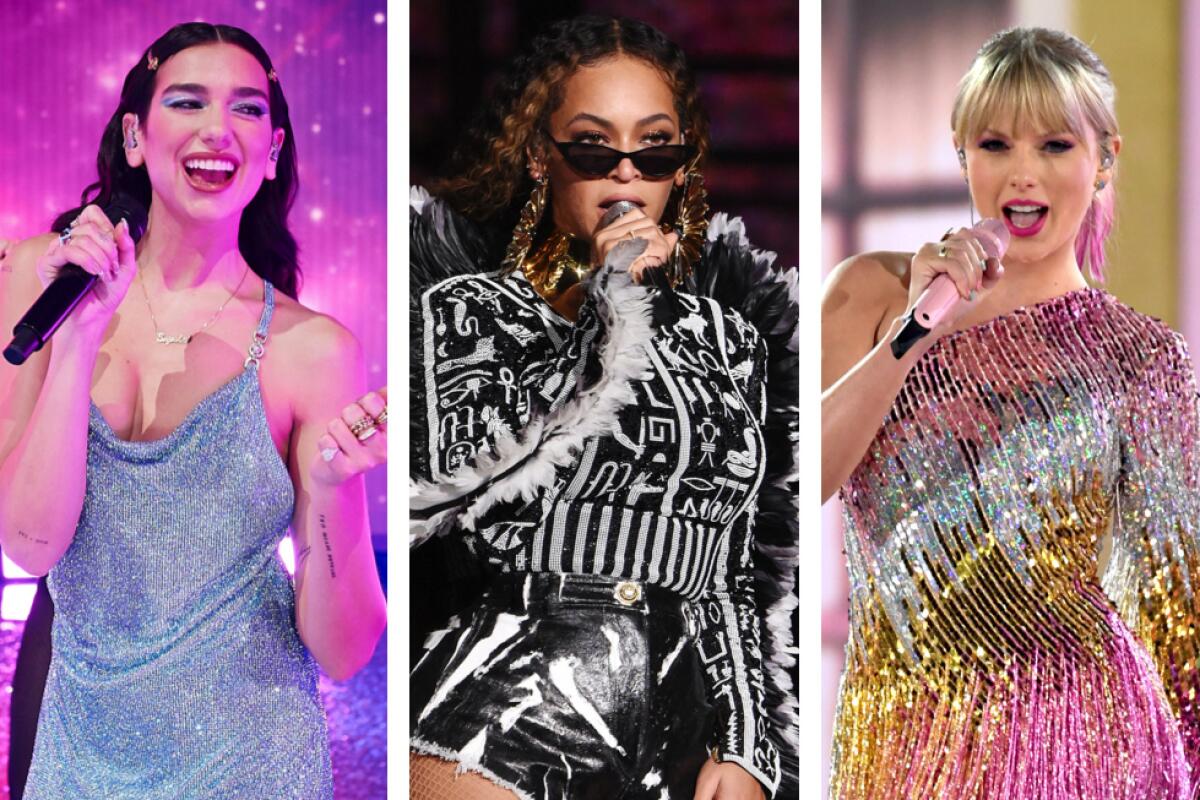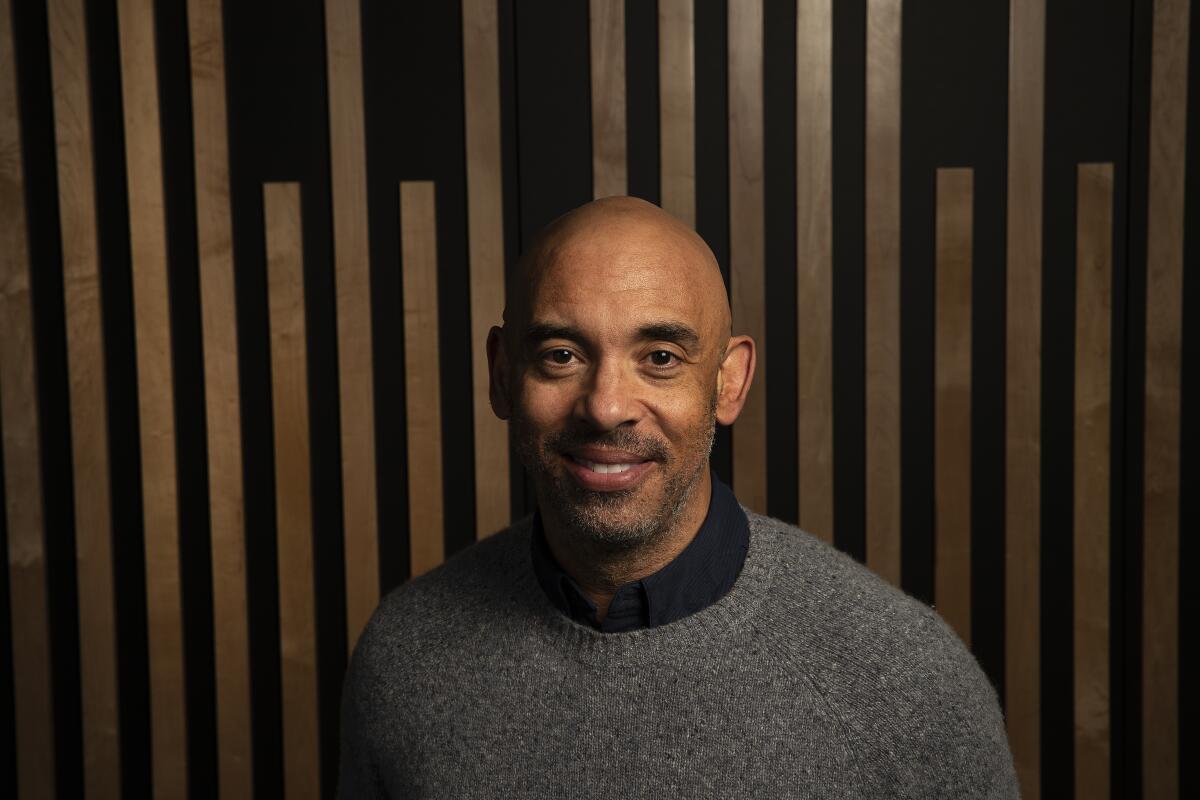Grammys 2021 postponed until March due to COVID-19 concerns

- Share via
The 63rd Grammy Awards will not take place Jan. 31 in Los Angeles, as had been planned by the Recording Academy, which presents the music industry’s most prestigious awards show.
The organization said Tuesday that the annual ceremony — postponed due to concerns over the spread of COVID-19 — would instead take place March 14.
“The deteriorating COVID situation in Los Angeles, where hospital services have been overwhelmed [and] ICUs have reached capacity, and new guidance from state and local governments have all led us to conclude that postponing our show was the right thing to do,” Harvey Mason Jr., the academy’s interim chief executive, said in a statement. “Nothing is more important than the health and safety of those in our music community and the hundreds of people who work tirelessly on producing the show.”
DJs who customarily would have performed for packed dance floors on New Year’s Eve instead sat home, angry at peers and partygoers who violated safety protocols.
The Grammys ceremony, which is broadcast on CBS, usually draws about 18,000 people to L.A.’s Staples Center and offers artists what might be the most impactful performance opportunity in pop music. In November, Mason told The Times that the show would take place “in and around” Staples and that he was aiming to have a limited in-person audience.
“It will be a huge spectacle,” Mason said, though he allowed that plans were subject to change.
Now L.A. County is in its worst surge of the pandemic, with patients in ambulances waiting up to eight hours to enter emergency rooms. The county is averaging 184 deaths a day over the last week — the equivalent of someone dying of COVID-19 every eight minutes.
A regional stay-at-home order, which prohibits gatherings involving different households, has been in effect since Dec. 6, and available intensive care unit capacity across Southern California is at 0%.
“Optimistically, we were thinking January would be a time when the virus had calmed down a little bit,” Mason said in an interview late Tuesday. “But with the direction of the numbers, it just felt like the complete wrong time to try and put together our show.” He said the decision to postpone was reached in the last “three or four days” and that “there were no differences of opinion” among the ceremony’s various stakeholders, including executives at the academy and at CBS.
The Grammys’ delay, first reported by Rolling Stone, comes as other Hollywood productions have been put on hold and late-night television shows including “Jimmy Kimmel Live!” and “The Late Late Show With James Corden” have said they’ll switch to remote taping. “Late Late Show” executive producer Ben Winston is set to to take over the Grammys telecast this year after decades with TV veteran Ken Ehrlich at the helm.
Trevor Noah of “The Daily Show,” who was announced in November as the telecast’s host, is still committed to that role, Mason said, along with “the majority” of acts who’d agreed to perform on the show. (The academy hadn’t yet said who was booked for the January date.)

Beyoncé leads Grammy nominations with nine, including for the coveted record of the year and song of the year prizes, followed by Taylor Swift, Dua Lipa and Roddy Ricch, each of whom received six. The nominations, which recognize work released between Sept. 1, 2019, and Aug. 31, 2020, were announced in November.
The Grammys ceremony is far from the only awards show to be affected by the pandemic. The Academy Awards has already been moved to April 25, from its original date of Feb. 28, while the Golden Globes, typically held in early January, will instead take place at the end of February. (Mason declined to comment on the fact that the Grammys’ new March 14 date coincides with that of the Screen Actors Guild Awards.)
In September, winners at the Emmys accepted their trophies remotely; June’s BET Awards and August’s MTV Video Music Awards featured a blend of live and pretaped performances.
The Country Music Assn. drew widespread criticism in November when it convened an in-person audience of largely maskless people inside Nashville’s Music City Center; a month later, veteran country star Charley Pride, who’d appeared on the CMA Awards, died at age 86 of complications from COVID-19, though it’s not clear where he caught the coronavirus.
The Recording Academy was forced to scramble in the run-up to last year’s Grammys ceremony when the organization’s previous CEO, Deborah Dugan, was ousted after making explosive allegations regarding discrimination and vote-rigging, and when Lakers legend Kobe Bryant was killed in a helicopter crash just hours before the show was set to begin.
Mason said details of the March show — including the size of any audience and the nature of performances — will remain “fluid” in order to comply with guidance from health and government officials, “who will have a say in what we’re allowed and what we’re not allowed to do.
“Because of that, I want to make sure we have the ability to tweak things here and there to make the best possible show — and the safest possible show,” he said.
Times staff writers Christie D’Zurilla and Rong-Gong Lin II contributed to this report.
More to Read
The biggest entertainment stories
Get our big stories about Hollywood, film, television, music, arts, culture and more right in your inbox as soon as they publish.
You may occasionally receive promotional content from the Los Angeles Times.











